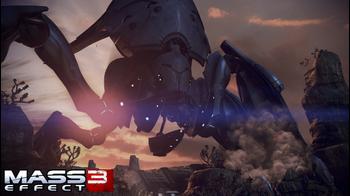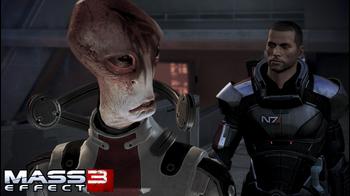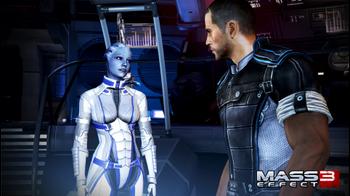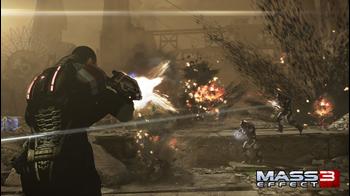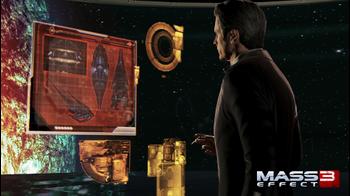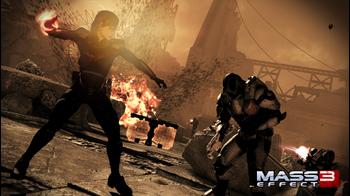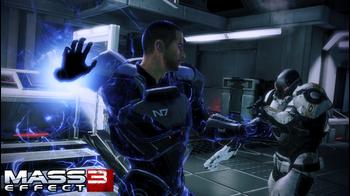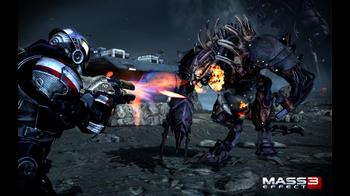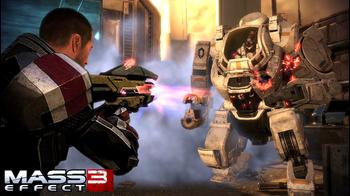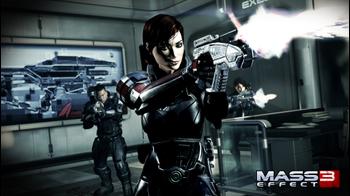
Mass Effect 3 Review
Mass Effect 3 is important. Sure, it's the final chapter of Shepard's epic story, but it also represents more. A far better representation of Bioware's vision than Dragon Age II was, the finale of Shepard's trilogy offers up a better vision of what the massive developer house, famed for the genre, think it means to be an RPG.
Some elements have been streamlined even a little further than the action-heavy Mass Effect 2, whilst others are brought back to be more complex and in-line with the first game in the series, which was arguably a much more hardcore experience.
Before we get into the details of the changes to the system, it's worth noting that Mass Effect 3 actually comes packing three different gameplay modes. Action Mode strips out the dialogue decisions - blasphemy, we know - making conversations play out like regular cutscenes. It maintains the combat as-is, allowing you to focus on fights and treat the game more like a traditional third-person shooter with character progression.
Story Mode does the opposite, stripping combat down to its simplest, easiest basics to allow you to focus on watching the story unfold and making decisions that affect it. It's not quite Heavy Rain, but it's pushing in that direction. The final mode, RPG Mode, is the traditional Mass Effect experience - and obviously the one we on this site are interested in.
It's worth noting, though, that the options of Story Mode or Action Mode instead of the traditional series experience are well executed. Story Mode could have a use in replaying through the game to see some of the alternative takes on scenes, and while I personally feel Action Mode kind of misses the point of Mass Effect the combat here is much improved and could stand solidly on its own - more on that later.
RPG mode is where it's at for us, and so Mass Effect 3 sees us bringing a decision-loaded Shepard from the original title into the game. The first impression wasn't great, though - a bug for players who've come all the way from the first title means that most will lose their Shepard's physical appearance and have to recreate it. After a few minutes of recreating Shepard's face we were sprung into action as the Reapers invade earth.
This review is spoiler-free, and it's hard to talk specifics about the story of Mass Effect 3 in detail, but what I can say is that I left it satisfied. Mass Effect 2's greatest strength was its character stories, a sometimes lacking plot arc succeeding thanks to the strong personalities of your squad and allies - the first title's strengths lay in painting a picture of a wider galaxy.
ME3 actually ends up a mixture of both. The playable squad is much smaller than the one on offer for 2's suicide mission, but a large number of old friends and allies all show up for expansions to their personal stories, closure and to help Shepard to battle the Reaper threat. Often times these characters are involved in heavy galaxy-effecting decisions - you're not on a closed, private mission this time, but dealing with very public problems.
Some of the best moments in the game involved seeing characters from the previous games such as Wrex and Mordin head into action and fulfil their potential. As someone who feels an affinity for much of that cast, ME3 was packed with punch-the-air moments as characters finally got what they deserved - good or bad.
We're not just talking ex-squad here, either - minor side-quest characters return, and the pay off from even smaller quests in earlier games is huge. A great, small example is Dr. Michel, the woman within whose clinic you met Garrus in the original Mass Effect. She sent an email in 2, but finally returns in person in 3 and has fulfilled her potential and become something better than a doctor in a small clinic in the wards.
One worry I had going into ME3 was that I'd struggle to believe characters' reasons for not joining the fight. Why would members of ME2's cast leave the Normandy and Shepard knowing what was coming? The way these choices are handled is mostly elegant and believable, and places returning characters into roles that suit them based on their development throughout ME2.
One of the key characters in the Mass Effect series to me is the Normandy, Shepard's ship. The Cerberus-built SR2 returns here, tweaked and adjusted and now commandeered by the Earth Systems Alliance to aid in the fight against the Reapers. It's the same ship but boasts new rooms, tweaks and improvements. That includes a badass war room with a big circular holographic table and a hangar more reminiscent of ME1's. It's generally a more interesting place to be in ME3.
Part of that is due to the way the crew now interact. Tension is high on the ship, with everyone knowing the end of days could be coming - and as such people talk. Walking in on Garrus in the battery won't always find him 'calibrating' - he may be on the comms system having a private chat to Liara about the last mission, offering an interesting insight into the cast of characters.
Characters move, too - so rather than sticking in one spot characters will appear in different places. To stick with the example of Garrus, he will sometimes be calibrating his beloved guns, but he'll also sometimes be found at the observation deck bar talking to another member of the crew, or swapping stories with newcomer James Vega in the crew quarters. At one point he's found sombrely staring at the Memorial Wall - a new addition to the ship, listing the names of all those lost across the Normandy's battles - reminiscing about those listed there.
These character touches are nice, and even extend past the core cast to the temporary friends who join you on the Normandy for a shorter stretch of time. Garrus recalls the events of ME1 and 2 with familiar faces when they board the ship, for instance - but much of it happens in optional conversations you can overhear.
One thing that's had much made of it in the past week is the suggestion that ME3 has less dialogue choices than previous games. Does it? The answer is complicated. Action and combat scenarios are definitely less verbose and talky than they were in the previous two games, with choices streamlined into simpler, more concise streams.
It feels as though many of the superfluous choices that didn't affect the plot in any way were stripped out, but what they're replaced with instead is more dynamic looking scenes. The old Bioware dead-eyed-stare whilst talking is in far less effect here - though it does still show up - with cinematic direction used to make even more mundane chats more engaging to watch.
When you're not on a combat mission talking is much the same as before, offering a variety of options that allow Shepard to plot the course of the story. In general it feels like early on you're coasting, choices you make less important because the events early on in the game are so dire that there is really only one path Shepard can take, no matter what's said in conversation. As your prospects improve the choices you can make do also, opening the game up.
Aboard the Normandy is where the changes are most noticeable at first - there won't be new strings of dialogue to dig into every time you complete a mission. Your crew might spout off a few lines in relation to the last mission, but it consists only of preset dialogue with preset responses from Shepard.
Conversations with crew still come, but they're structured in more interesting ways - they might ask to meet you in a 'hub' zone like the Citadel Presidium or a Club for a chat or a dance, and during that sequence the regular character development will play out. Characters who aren't love interests can visit Shepard's Cabin for some more private downtime, too. It makes it feel like there's less going on between missions, but around the same amount of choices are on offer - it's just structured differently.
I believe this structure works well; The set-pieces on offer can really help to drive home character relationships - such as chatting whilst engaged in a sniping competition with Garrus or hitting a cafe with Ashley to hear her talk about her military family upbringing. It's much better than hearing these stories in one static room of the Normandy from a static camera angle.
It also makes sense for the story; with the war on, when you're on a mission everybody appears more focused. Daddy issues, rife in ME2, are held deep down - issues and problems only surfacing when you do get some actual downtime.
It's these relationships and the thread they've carried right through the entire Mass Effect series that is the real triumph of the story. Punch-the-air moments don't just happen because the game is being badass - though it has its moments there - it happens because, as I said earlier, you're finally seeing characters hit their stride.
Sometimes that dialogue wheel isn't enough. It isn't going to save everyone. No matter how hard you try there's going to be more Normandy Crew and ex-crew names going up on that memorial wall. Who and how will be determined by your decisions or by decisions you've already made in other games. It doesn't feel like the game is robbing you, either - it feels like there is no other way.
The loss of familiar faces is only one of many ways your data from the first two games is used, with ME3 going deeper into that than 2 ever bothered to do. Bioware clearly wanted to pay off every single thread they could, and so even tiny side quest story flags from ME1 are resolved here.
Cerberus' and the Illusive Man's descent into the truly terrible is believable, and they make a perfect secondary enemy to the Reapers themselves. The palpable sense of fear portrayed throughout - especially in places like the Citadel - gives an image of a war that you have a chance to stop but has already done immeasurable damage. Overhearing scared conversations is designed to strengthen your resolve, and it works.
Here's the rub about the story and dialogue choices - I didn't leave this game feeling that the character development was inferior to its predecessors. The execution is equal, though the dire circumstances presented in the story give Bioware some emotional meat to play with throughout.
It's no flippant statement to say I absolutely loved the story of Mass Effect 3. Later in the game it becomes clear just how well woven and crafted the storyline of the first two games was. While it is obvious things changed, it's also plain to see that much of this was - impressively - planned from the word go. It was quite clearly all intricately planned. The payoff on the way is as good as I'd hoped, and though the final moments of the game lacked finesse, I found myself still satisfied when the dust settled.
There is a catch, mind - Importing a character is vital, I think, to enjoying the game as much as I did. So much of this game hinges on events past - and while the game does an adequate job of filling newcomers in, the greatest joy in ME3 is reserved in moments designed to reward those who have been there since the very beginning. The more ME you've played, the more you'll get out of it.
Combat will be largely familiar to those who played Mass Effect 2 - the third person shooter feel returns, though it's been vastly improved once again in a number of ways including with more traversal options. Arrows will appear to clue you in on where you can move from cover, vaulting over it or rolling and running from one piece of cover to the next, for instance.
Ladders can be climbed to get a height advantage, too, and sprinting feels like a more viable option in general with more control over it mid-movement. The new charged up melee attack has its uses, but none of these new additions dominate gameplay - the same emphasis is placed on gunplay, powers and squad management that there's always been.
More intelligent enemies fit into more obvious categories now, with Bioware seemingly placing a big focus on silhouettes. Like Team Fortress or Halo, it's easy to identify what offensive powers your enemy will be packing just based off what they look like - and it's easy to see that from a mile off thanks to clever design.
ME3's combat feels tighter and more fun as a result of these changes. Bioware's even clearly learned a lot about level design, as combat zones now feel more like real places more often than they do shooting galleries with conveniently placed shipping boxes for cover - though it is still guilty of that in places. On Action Mode, ME3 could finally live up to being called a shooter if that's what you wanted.
There are more classes than Soldier, though, and so through that we hit the more traditional RPG elements of the combat. Progression is beefed up and like the story straddles ME1 and ME2 proudly, trying to poach the best from each. It takes nuance from the first game and simplicity from the second, merging them to give a simple upgrade tree that you don't need to be an RPG fan to understand but allows RPG fans to spec characters differently.
Rather than levelling-up each power a number of times and getting one arbitrary upgrade, each power can be boosted six times. Of these six, three force you to make a choice of what bonuses to bestow on yourself. When faced with the choice between more damage and duration or a faster recharge time to use an offensive power more often, what suits your play style more?
These questions become important, especially on higher difficulties, and each subsequent choice for each ability becomes more granular and effective. The same ME classes return for Shepard himself to choose from, while the core cast represent those classes well, too. Your squad have the same levelling mechanic as Shepard, and again choosing how they're loaded out will hugely impact how they perform in different combat situations.
One new aspect of the game's powers is Shepard-exclusive, though - weight and recharge time. ME2 forced even power-heavy classes to do a lot of shooting thanks to slow universal cool downs on powers - but ME3 has a remedy for that.
Each gun you carry weighs Shepard down, and the more weight he carries, the slower his power recharge time is. If you want to be a tank carrying 5 different weapons that's fine - but your recharge time on powers will be slow as hell. Alternatively, you can spec a more 'mage' like Shepard who only carries a pistol but packs a range of devastating Biotic and Tech powers that recharge almost instantly.
It's a great compromise - if shooting is your thing you can enter the fight armed to the teeth, while if not you can focus on powers. It's like being back in the original Mass Effect, with Shepard and squad much more easily able to combine powers to devastating effect - it rocks.
Another thing that's more similar to the original title is how weaponry works. Upgrades are back in the form of attachments you can smack on a weapon. Like most ME1 weapons each can hold two attachments, and these range from scopes that'll increase your accuracy to expanded heat sinks that allow more shots before a reload and extended barrels that increase damage.
These upgrades aren't just statistics but also cosmetically change the look of the gun. If you slap a longer barrel on something, it'll even have a longer barrel in cutscenes - a nice touch. The primary feature here is how modified guns change in combat, and there's a much larger range of weaponry here than either of the other ME titles.
In addition to modifications you can upgrade weapons outright. The first weapon in each class will be marked as I, but a bench in the Normandy lets you purchase upgrades to II, III and so on - a nod to ME1's numbered weaponry. Each subsequent weapon boasts a lower weight, higher damage, larger magazine size - and generally improve greatly - but it's expensive business.
As well as weapon upgrades cash can be spent out on a wide variety of new modular armour variants. All this goes in to replace the Science Bay from ME2 - now gone. Liara also has a little drone friend who processes some of the resources you find on planets into optional upgrades.
These are one-time choices, so some Reaper Tech found on an invaded world by scanning there might give you a choice between a permanent 5% bonus to either your Power Damage or Shields. These bonuses are found often and span a wide variety of buffs.
The way these buffs are laid out mean that there's no inventory management as such - you need only buy each kind of weapon and upgrade once before everyone can use it. It gives you the choice without any of the clutter, and there's a lot more nuance to this system than ME2, where it was very easy - and encouraged - to max out every single thing in the science bay.
That's the rule about the RPG and progression elements of the combat gameplay in general - it's more nuanced than ME2 but more streamlined than ME1, offering you the options but keeping the massive, unfriendly inventory screens out of sight. It works, and I felt throughout ME3 that I had a better degree of control over my Shepard's development than before.
The amount of RPG stuff you do is something that can be affected by your play-style and class - but ME3 is still definitely an RPG - and a bloody good one.
Side quests are replete, often found through dialogue that is simply overheard. Few characters stand around waiting for you to come and offer help, but if you hear someone talking about a missing family member or a piece of lost technology that'd help the war effort it'll pop in your journal and if you want you can resolve it for a reward - it's that simple.
More fully-featured side quests, N7 Missions, are sent to you from the Alliance. Some quests are time-sensitive, like hitting the Collector Base after the abduction was in ME2. The simpler side quests feel more like ME1, and I was doing an awful lot of wandering around the Citadel tracking down people and helping them out to bolster the war effort in significant ways.
Almost every side mission in the game feeds back into the 'Galaxy at War' - an interface in the Normandy's war room that tracks what troops you have available. Tracking down a crashed Turian ship for someone on the Citadel might not seem like a big deal compared to the rest of the galactic war, but dealing with that problem may award the loyalty of ships or technology that'll help your chances against the Reapers in the end.
This Galactic Readiness meter represents the core of ME3's gameplay - for you can rush through to the end with it barely full and face the consequences. It's not all about side quests, either - Brokering deals between warring races like the Quarian and Geth in order to have them assist might not always be possible to all players.
In the event you're forced to make a choice, you might only get one of those fleets. Decisions have to be made carefully - and every single ship and ally you can garner even through the smallest quest will help.
Some of those quests require planet scanning, which now takes place through a mini-game that streamlines the whole process. It still feels like a distraction and time filler, but it's a more interesting and less time-consuming one than the previous game.
The Reapers are everywhere, and spending too much time in one system scanning will cause them to arrive to hunt you down - so you need to quickly make your escape when that happens and return after a mission. Even these areas aren't 'bad' - they just pale in comparison somewhat to the rest of the experience.
Visually the game looks and performs much the same as Mass Effect 2 did. Animation is improved but still sometimes a little uneven, but fantastic art and design helps to keep it impressive. Areas from previous games expand and we get a first look at other home worlds, expanding the universe further.
Great presentation continues, with the voice cast putting in a stellar performance once again. It feels like the direction has improved over ME2's, and soaring moments are punctuated by brilliant voice performances. The soundtrack chooses to mix the synth tones the series is known for with epic orchestral scores in other places - and it works. Classic tunes from through the series return, helping to conjure up memories of the first two games.
The multiplayer is fully-featured and solid but ultimately is still an afterthought. While you can import multiplayer characters to single-player to make them offer a statistical boost to your Galactic Readiness rating, it's hard to really get super excited for more wave-based survival, even if the Mass Effect powers and abilities make it more interesting than in your average shooter.
The multiplayer offers full character progression and a first chance to directly control Asari, Krogan, Drell, Salarian and Quarian characters, but it is in the end a minor distraction from the main event. The multiplayer team have done a good job bringing these one-man systems into a multiplayer environment and it plays well thanks to the more fluid, shooter-like controls - but it's still not the focus.
Mass Effect 3 is a more than worthy suggestion of where the future of the action RPG could go. Its dark, morbid plot justifies the existence of the more action-focused combat, but beneath that bombast there's a beating heart of character relationships, emotion and in-story role playing just as there was in the previous two games.
The real cherry atop Mass Effect's cake is the save import between the games. The satisfaction you'll feel watching your choices unfurl in ways large and small is unprecedented and impressive, but this is a good enough game that even without that context it'll be enjoyable. Mass Effect 3 is a finale, though, and is improved by experiencing the two prior acts.
More than anything, I'm glad to see Bioware place RPG elements that were absent from Mass Effect 2 back in place, stepping back towards the RPG in some small but significant ways. The choice is greater here, and so the experience I had in combat was, this time, equal to the one I had with the story.
A handful of bugs and dodgy moments aren't enough to drag Mass Effect 3 down. It's not perfect, but as a delivery of the package Bioware had conceived, it's pretty damn close. It's epic, exciting, fun and ultimately - above all else - satisfying. Shepard's story may be over, but I can't wait to see what this team does - and what happens to this universe - next.
